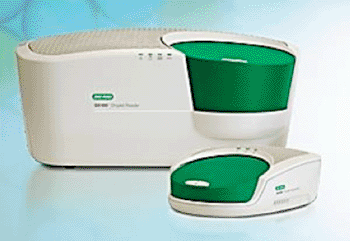DNA Blood Test Increases Targeted Treatment Access
By LabMedica International staff writers
Posted on 20 Jun 2013
A molecular blood test for women with breast cancer could identify more women who will benefit from the targeted drug treatment with Herceptin, without the need for uncomfortable biopsies.Posted on 20 Jun 2013
The blood test is a liquid biopsy that uses cutting-edge genetic techniques to detect breast cancer DNA in the bloodstream and can detect whether breast cancers are being driven by too many copies of the Human Epidermal Growth Factor Receptor 2 (HER2) gene.

Image: The X100 droplet PCR system (Photo courtesy of Bio-Rad).
Scientists at The Institute of Cancer Research (London, UK) obtained 58 blood samples from a consecutive prospective series of patients with metastatic breast cancer treated at the Royal Marsden Hospital (London, UK) between 2010 and 2012. They used microarray comparative genomic hybridization data from 311 invasive breast cancers, 65 HER2-amplified, and 246 HER2-nonamplified to identify an optimal chromosome 17 copy number reference region.
The digital polymerase chain reaction (dPCR) was performed in 384-well format with 360 well for sample assessment and 24 wells of negative control prepared without the addition of sample DNA. The dPCR was performed on the X100 droplet PCR system (Bio-Rad; Hercules, CA, USA). The results showed substantially higher concordance with tumor-derived HER2 status compared with prior reports of noninvasive approaches.
The new technique was able to accurately identify HER2-positive breast cancer in 7/11 (64%) of the patients, 44 of 47 (94%) were classified as plasma DNA digital PCR HER2-negative. This gives a positive predictive value of 70% and negative predictive value of 92%. The authors concluded that the analysis of plasma DNA with digital PCR has the potential to screen for the acquisition of HER2 amplification in metastatic breast cancer. This approach could potentially be adapted to the analysis of any locus amplified in cancer.
Alan Ashworth, PhD, FRS, CEO of the Institute of Cancer Research, said, “This new liquid biopsy has exciting potential as a means of analyzing tumor DNA in the blood stream, allowing clinicians to track genetic changes as they happen and adjust treatment to them. By assessing quickly and painlessly whether a particular gene is activated in breast cancer, doctors will be able to choose the best targeted therapy for their patients.” The study was published on May 1, 2013, in the journal Clinical Cancer Research.
Related Links:
The Institute of Cancer Research
Royal Marsden Hospital
Bio-Rad













